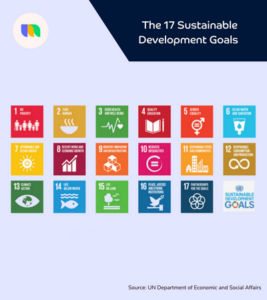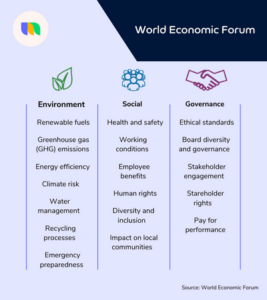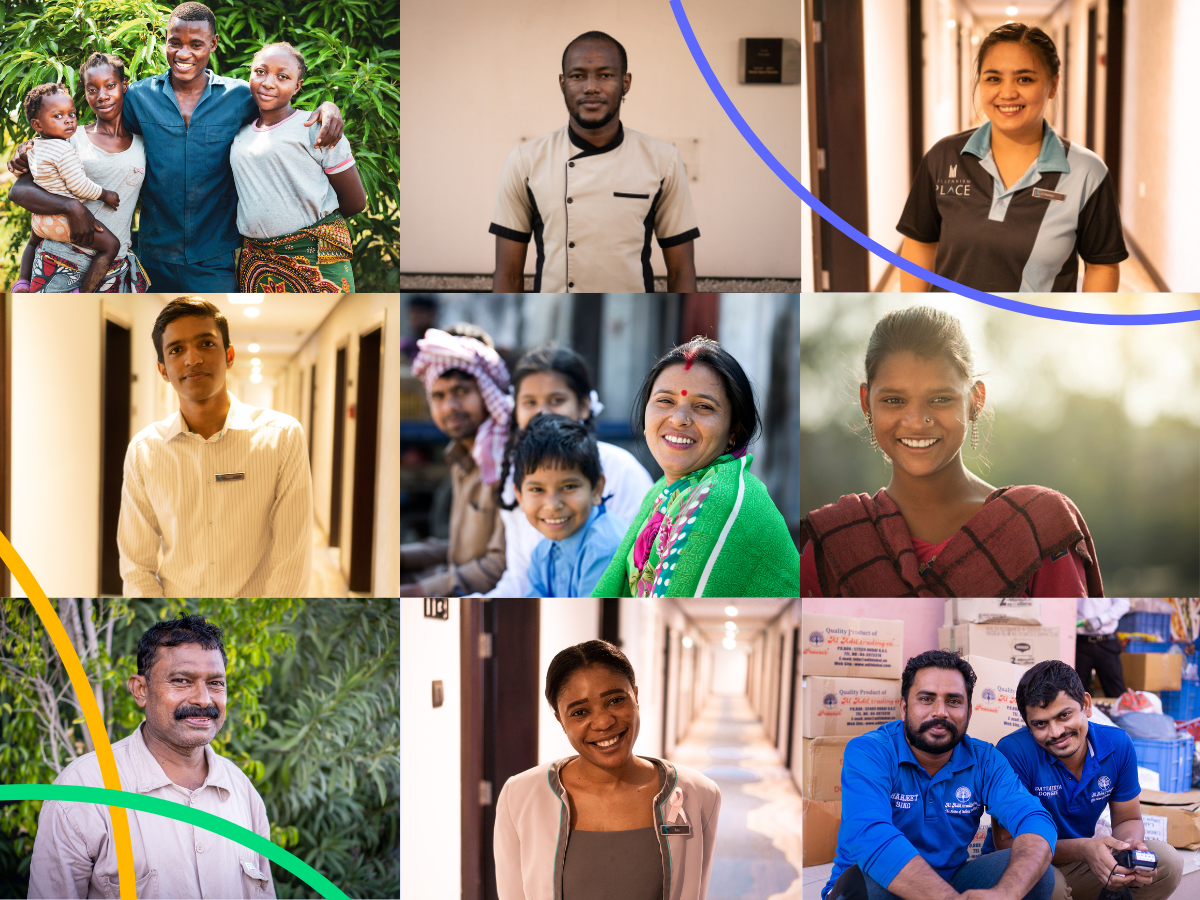Regardless of size, every business can easily contribute to the accomplishment of the UN’s Sustainable Development Goals by improving financially inclusivity for employees.
The global private sector has moved away from the time when shareholder profit was the sole motivation of executives. According to McKinsey and Co, 90% of S&P companies and 70% of Russell 1000 companies now publish ESG (environmental, social, and governance) reports, which are increasingly a major driving force of shareholder capital.
As a result, sustainability-focused investment funds (usually ETFs that invest in companies considered sustainable) have seen a sharp rise in growth. According to the Mckinsey and Co study referenced above, investments in sustainable funds grew from $5 billion in 2018 to a whopping $70 billion by 2021.
All of this shows that the private sector is a focal player in the move towards sustainability, especially as outlined in the UN’s Sustainable Development Goals (SDGs), the broad list of 17 key goals that the UN is looking to achieve by 2030.
“The SDGs describe the greatest challenges and needs of our time and the goals for addressing these,” according to the United Nations Development Programme (UNDP).
Yet, “achieving these goals require collective action across governments, civil society, private sector and dedicated individuals and communities and need to be matched with the necessary resources, innovation capacity and partnerships to drive implementation.”
Financial inclusion is a key strategy in eight of these 17 SDGs, according to the UNDP. And with UAE-based fintechs like NOW Money helping companies to provide employees better access to basic financial services through mobile bank accounts, improving financial inclusion can be easily achieved for many UAE companies.
In this article, we will consider what these SDGs are, how they have been translated into key objectives for the private sector, and what businesses in the UAE can do to help achieve them.
We’ll cover:
- UN SDGs and the role of businesses
- The benefits of sustainability to businesses
- How businesses in the UAE can participate in the achievement of SDGs
Looking for a way to improve sustainability at your business. You can boost financial inclusion in the UAE by introducing smart, flexible, and low-cost payroll software that allows workers to open mobile bank accounts. Sign up for NOW Money or learn more about how our product can help improve your payroll management.
1. SDGs and the role of businesses
A brief overview of the SDGs
In 2015, all the member states of the UN adopted the SDGs as a “a shared blueprint for peace and prosperity for people and the planet, now and into the future,” according to the UN.
The SDGs were created not as the purview of the developed nations but a global partnership between developed and developing countries directed towards the end of poverty, sustainable and inclusive economic growth and development, and responsible protection of the environment.
The 17 SDGs are:
- No poverty
- Zero hunger
- Good health and wellbeing
- Quality education
- Gender equality
- Clean water and sanitation
- Affordable and clean energy
- Decent work and economic growth
- Industry, innovation, and infrastructure
- Reduced inequalities
- Sustainable cities and communities
- Responsible consumption and production
- Climate action
- Life below water
- Life of land
- Peace, justice, and strong institutions
- Partnership for the goals

Source: International Organisation of Employers
For the UN, these are not mere lofty hopes. Instead, the UN has so far created 169 targets, organised 3,516 events, published 1,326 documents, and taken 6,584 actions towards the achievement of these goals.
Furthermore, the UN published implementation reports that show how far they have gone in the implementation of these goals and what remains to be done.
These progress reports have been published every year since 2016, and a Global Sustainable Development Report is published every four years for a giant review in the UN’s General Assembly.
In essence, the UN has been taking practical and measurable steps to make these goals a reality since they were launched.
One of such steps is the global effort towards improved financial inclusion. As said in the introduction, the UNDP has identified financial inclusion as key to the achievement of SDG numbers 1 (no poverty), 2 (zero hunger), 3 (good health and well-being), 5 (gender equality), 8 (decent work and economic situation), 9 (industry, innovation and infrastructure), 10 (reduced inequalities), and 17 (partnerships for goals).
According to them, “There is academic evidence that financial inclusion models can support overall economic growth and the achievement of broader development goals.” Therefore, they have been working to “support banks, cooperatives, microfinance institutions, money transfer companies and mobile network operators to extend the reach of financial markets where they would otherwise not go.”
The role of the private sector
“The private sector, in this context, is an indispensable partner and has a critical role to play in advancing the global development agenda,” according to the UNDP.
The private sector is an important player because, in developing countries, they constitute (on average) 60% of the GDP, generating 90% of the jobs, and are responsible for 80% of capital flows. More specifically, “the private sector contributes to development by providing goods and services, financing social and economic investments through taxes, and creating innovative solutions to help tackle development challenges.”
However, for the private sector to fully contribute to these goals, they will need to “measure the impact of their actions, set ambitious targets and communicate their progress transparently,” according to Ban Ki-moon, the former Secretary General of the UN.
This is why the SDGs have often been translated into the strategic goals of the private sector through the popular Environmental, Social, and Governance (ESG) terminology.
Yet, ESG Investing goes much further back, and was indeed born in 2004 from Secretary General Kofi Annan’s invitation to CEOs of 50 major financial institutions to participate in a “joint initiative under the auspices of the UN Global Compact and with the support of the International Finance Corporation (IFC) and the Swiss Government,” according to Forbes.
The report that followed, titled “Who Cares Wins,” described the goal of ESG investing as “embedding environmental, social and governance factors in capital markets makes good business sense and leads to more sustainable markets and better outcomes for societies.”
Though ESG investing predates the UN SDGs, a look into the components of the former will reveal that it is a suitable application of SDGs to the private sector. According to Investopedia, these are the key parts of each:
- Environmental: “Corporate climate policies, energy use, waste, pollution, natural resource conservation, and treatment of animals.” It includes identifying the environmental risk a business poses and highlighting measures they are taking to manage them.
- Social: Donations to and volunteer work in the local community, employees’ health and safety, the ESG compliance of suppliers, diversity, inclusion, social justice, corporate ethics, etc.
- Governance: “Ensures a company uses accurate and transparent accounting methods, pursues integrity and diversity in selecting its leadership, and is accountable to shareholders.”

Source: World Economic Forum
While the SDGs are broader and involve many stakeholders (of which nation states themselves are primary), ESG factors provide a lens through which businesses can look at and support SDGs.
For example, companies who prioritise the health, safety, and training of their staff are contributing to the achievement of two SDGs: good health and wellbeing and quality education. Also, companies who are reducing their carbon footprint are supporting at least two SDGs: responsible production and consumption and clean water and sanitation.
Furthermore, companies committed to diversity and financial inclusion are participating in the achievement of at least one SDG: reduced inequalities. And as we have seen, they might even be contributing to seven other SDGs.
For many companies, a commitment to financial inclusion means ensuring that their employees have transaction accounts where they can easily receive and spend money, in addition to other financial services (like international money transfers and airtime recharge). In a country like the UAE where banks have stringent requirements to open traditional accounts, this will involve companies working with mobile banking service providers like NOW Money who offer mobile bank accounts for company’s employees.
We can go on and on, but the point should be clear by now: “By aligning ESG with the areas highlighted by the UN, you also help your business make its contribution to the SDGs,” said BoardClic, a SaaS board evaluation platform.
2. The benefits of sustainability to businesses
Gradually, sustainability is moving away from the leisure of bigger and more established companies to a must-have tenet for businesses of all sizes. A contributing factor to this shift is the recognition that sustainability is actually good for business.
While altruism should be enough motivation to contribute to the SDGs, there is no denying the fact that sustainability is beneficial for the bottom line.
So, what are the benefits of sustainability to businesses?
According to UNDP, there are five:
- Generating new revenue: We live in a world where sustainability has become more important. For example, The Global Sustainability Study 2021 published by Simon-Kucher & Partners, a consultancy firm, showed that between 2016 and 2021, 85% of respondents (individuals) were committed to changing their purchasing patterns towards becoming more sustainable. Similarly, 92% of respondents to a Forbes survey said they are more likely to trust environmentally and socially-conscious brands.
Consequently, companies who adhere to sustainability guidelines and execute sustainability initiatives can differentiate themselves and become more attractive to the growing number of people who care about sustainability. No wonder that a Harvard Business Review survey has shown that companies who care about corporate responsibility increase sales revenue by up to 20%.
Also, these companies can gain access to new or early-stage markets (for example, investing in renewable energy) where they can profit from early-mover advantages.
- Attractiveness for improved recruitment and retention: A 2021 study published by IBM has shown that 71% of employees consider environmentally sustainable firms as more attractive. Also, a study by UCLA Newsroom has shown that workers in eco-friendly companies are 16% more productive than others.
In this world, companies who prioritise sustainability are in a better position to recruit better staff and retain them through a happy and healthy workplace.
To take another example, companies who ensure financial inclusion will contribute to improving the personal finances of their employees as well as reducing the stress, cost, and time spent to access financial services. This will lead to less time off work, higher engagement at work, and more productivity. Such an environment will be attractive to new workers as well as encourage current ones to stay on.
For more benefits of financial inclusion to employees, employers, and the society, read “6 Benefits of Mobile Banking for Employers, Workers and Society“
- Increased supply chain resilience: According to McKinsey and Co, before the pandemic, companies experienced a supply chain disruption of up to two and three months every 3.7 years. For those in the consumer goods sector, these disruptions meant a 30% drop in Earnings Before Interest, Tax, Depreciation, and Amortisation (EBITDA).
A focus on sustainability can help companies future-proof their supply chain as well as improve resilience and agility in the present.
- Attractiveness to investors: In the introduction, we saw that funds invested in ESG companies increased from $5 billion in 2018 to almost $70 billion in 2021. Also, in 2021, 28% of fund managers across the globe responding to a Harvard Law study said that ESG is central to their investing approach while 84% use it in one way or another.
As more investors consider ESG factors and use ESG rating systems like the ones provided by MorningStar and MSCI to guide their stock investments, among others, companies that want to attract shareholders will have to improve their sustainability efforts.
- Being ahead of the curve of regulatory compliance and risk management: Since all UN member states are partners in the achievement of the SDGs, it is expected that many countries will seek to increasingly regulate their industries to improve their SDG performance. Adjusting to these regulations and managing risk may be difficult for many companies.
In contrast, those who adjust on their own before these regulations come hard and fast are in a better position to manage risk and achieve stability. Therefore, it makes business sense for companies to stay ahead of the curve.
The World Business Council for Sustainable Development summarised all this in these words: “Pursuing sustainable development makes firms more competitive, more resilient and nimble in a fast changing world and more likely to win and retain customers. It can also help them find and keep some of the best brains on the market. In addition, it can make them more attractive to investors and insurers, while reducing their exposure to regulatory and other liabilities.”
3. How businesses in the UAE can participate in the achievement of SDGs
What practical steps can UAE companies take to participate in the achievement of SDGs?
According to a University of Oxford article, there are three clear paths that businesses can take:
- Company-wide strategic planning: This includes creating climate policies at the departmental level, hiring individuals to oversee compliance, encouraging individual workers to reduce energy use and embrace recycling.
- Awareness and education: Raising awareness in relation to SDG goals both internally (employees) and externally (suppliers and peer organisations). Also includes working with other companies to contribute to the achievement of SDGs.
- Measurement and improvement: Setting targets for the use of renewable energy, regularly measuring performance, and taking steps to improve.
For Seventeen Goals Magazin, a magazine that tells inspiring stories of how various stakeholders are contributing to the SDGs, businesses taking the following steps are already contributing to the achievement of SDGs:
- Looking after the well-being and health of employees
- Knowing the conditions under which their supply chains operate
- Awareness of measures that reduce their company’s carbon footprint
- Paying employees fairly and in a gender-neutral way
- Allowing employees time to engage in social activities (target depending on type of engagement)
- Actively supporting the common good in their community (goal depending on type of support)
Again, a look at the points highlighted by Seventeen Goals Magazin shows the alignment between SDGs and ESG factors. The 6 points above correspond to Social, Social, Environmental, Social, Social, and Social factors respectively.
Having considered how businesses can contribute to SDGs in general, let’s take a more specific look at the UAE.
At the just concluded Future Investment Initiative 6 (FII6), Saudi Arabia and Bahrain committed to achieving net zero emissions by 2060 and UAE by 2050. Furthermore, Saudi Arabia committed to reduce carbon emissions by 278 MTA by 2030.
Though these economies rely on oil, the commitment to net zero is part of their intention to achieve economic diversification in order to reduce reliance on fossil fuels and achieve sustainable economic growth and development.
During the conference, Amin Nasser, the CEO of Aramco, Saudi Arabia’s public petroleum and gas company, announced the launch of a $1.5 billion sustainability fund that will help tackle climate change. Also, in the first ever Voluntary Carbon Market auction, 15 regional companies bidded to buy a total of 1.4 million tons of high-quality CORSIA-complaint carbon credits that will help fund critical climate actions in the global south.
The conference also emphasised the need for investors to focus on companies that are generating positive impacts in society. As Dr. Rodrigo Tavares, founder and CEO of Granito Group, a financial services firm, puts it, “impact investing is about investing in companies whose products and services generate positive social environmental impact, and that impact needs to be measured.” Said differently, “there is no good investment without integrating ESG.”
In essence, the GCC countries are making efforts to support the SDGs by committing to sustainable economic growth and development that requires a greater care for the environment (goals 6, 7, and 13), all while encouraging players in the private sector to be more ESG compliant.
Furthermore, the UAE government has published a comprehensive report on its efforts towards the implementation of SDGs at home and abroad. It has also created a portal where everyone can access implementation data and reports.
Like the UN itself, the UAE cannot make positive strides in its attempt to achieve the SDGs by 2030 without an improved participation of its private sector.
There are many areas that different companies can explore based on their core operation, the community they serve, and available funds. The important point is that irrespective of size, there is something positive that every UAE business can do to support SDGs.
One area in particular of importance is overcoming barriers to financial inclusion.
The importance of investing in fintechs that are disrupting traditional finance and expanding access to financial services was one of the main talking points at FII6. With a “population that is growing, with a high percentage of youth that are tech savvy, you have a high penetration of mobile, and there are a number of places that are underbanked,” said Samer Haj-Yehia, chairman of Bank Leumi. “So the potential here is huge.”
Through fintechs, those who are outside of the financial system can be brought in, providing them access to transaction accounts as well as other financial services that will improve their standard of living.
This is an opportunity that companies in the UAE can explore through NOW Money, a digital payroll fintech platform that provides mobile bank accounts for employees of companies who are signed up to its payroll software. With these accounts, employees can receive and send money, make international transfers, withdraw money and purchase goods and services with a debit card, recharge international phone numbers, among others. And as the UNDP has argued, a financially inclusive society is already contributing to eight SDGs.
In addition, the UAE government has been publishing laws and regulations to ensure that private sector establishments adhere to standards dictated by the SDGs.
For example, according to Article 4 of the Labour Law, Federal Law No. 33 of 2021, “any discrimination on the basis of race, colour, sex, religion, national or social origin or disability which would have the effect of nullifying or impairing equality of opportunity, or prejudicing equal treatment in the employment, the maintenance of a job and the enjoyment of its benefits, is prohibited.”
At NOW Money, our workforce have real-life opportunities to shape how migrant workers are treated in the region. We hire, train and retain advocates for social change. This includes hiring across all nationalities, genders, religions and demographics.
This law is a reflection of at least two SDGs: gender equality and reduced inequalities. By adhering to it, companies can participate in the SDGs.
For more on the different types of employee discrimination that the Labour Law frowns upon, read “9 Common Types of Employment Discrimination in the Workplace”
One way to do this, for example, is to ensure that you are paying every worker what they deserve at the right time.
Doing this requires the use of a smart and flexible payroll management software that gives you complete visibility of your workforce payroll and allows you make changes that will remove any form of discrimination.
NOW Money provides such a payroll software. And when you sign up for this platform, you will provide your employees an opportunity to get mobile bank accounts, making an important contribution to improved financial inclusion in the UAE in the process.
Do you want a payroll management system that will help you keep your employees happy as well as adhere to government regulations? Sign up for NOW Money or learn more about how our payroll software can help your business
Takeaways
-
The UN’s SDGs are designed to end poverty, achieve sustainable and inclusive economic growth and development, and ensure a safer environment.
-
To achieve these goals, the private sector must be an active player and stakeholder.
-
Irrespective of size, every business can take steps to improve their ESG compliance.
-
Businesses who want to thrive in this new world must contribute to the achievement of these SDGs.
-
Adherence to sustainability standards is good for business.







